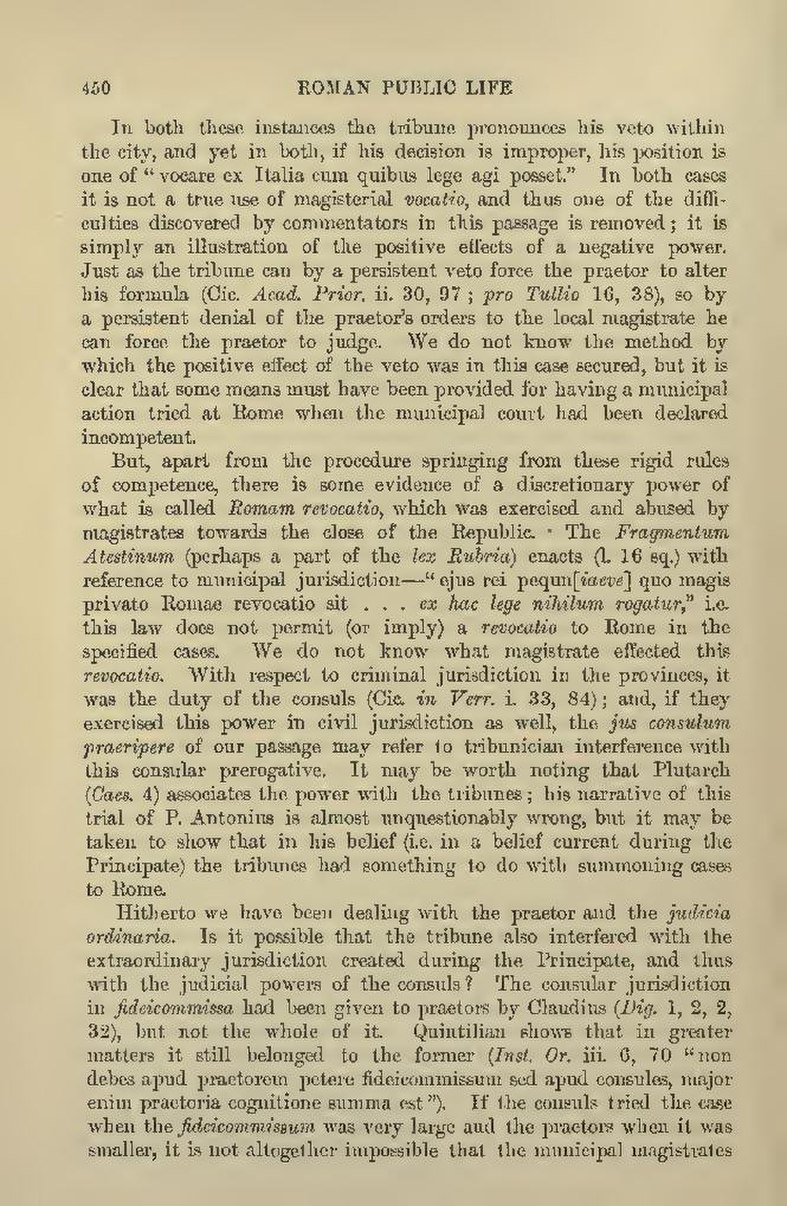In both these instances the tribune pronounces his veto within the city, and yet in both, if his decision is improper, his position is one of "vocare ex Italia cum quibus lege agi posset." In both cases it is not a true use of magisterial vocatio, and thus one of the difficulties discovered by commentators in this passage is removed; it is simply an illustration of the positive effects of a negative power. Just as the tribune can by a persistent veto force the praetor to alter his formula (Cic. Acad. Prior. ii. 30, 97; pro Tullio 16, 38), so by a persistent denial of the praetor's orders to the local magistrate he can force the praetor to judge. We do not know the method by which the positive effect of the veto was in this case secured, but it is clear that some means must have been provided for having a municipal action tried at Rome when the municipal court had been declared incompetent.
But, apart from the procedure springing from these rigid rules of competence, there is some evidence of a discretionary power of what is called Romam revocatio, which was exercised and abused by magistrates towards the close of the Republic. The Fragmentum Atestinum (perhaps a part of the lex Rubria) enacts (l. 16 sq.) with reference to municipal jurisdiction—"ejus rei pequn[iaeve] quo magis privato Romae revocatio sit . . . ex hac lege nihilum rogatur," i.e. this law does not permit (or imply) a revocatio to Rome in the specified cases. We do not know what magistrate effected this revocatio. With respect to criminal jurisdiction in the provinces, it was the duty of the consuls (Cic. in Verr. i. 33, 84); and, if they exercised this power in civil jurisdiction as well, the jus consulum praeripere of our passage may refer to tribunician interference with this consular prerogative. It may be worth noting that Plutarch (Caes. 4) associates the power with the tribunes; his narrative of this trial of P. Antonius is almost unquestionably wrong, but it may be taken to show that in his belief (i.e. in a belief current during the Principate) the tribunes had something to do with summoning cases to Rome.
Hitherto we have been dealing with the praetor and the judicia ordinaria. Is it possible that the tribune also interfered with the extraordinary jurisdiction created daring the Principate, and thus with the judicial powers of the consuls? The consular jurisdiction in fideicommissa had been given to praetors by Claudius (Dig. 1, 2, 2, 32), but not the whole of it. Quintilian shows that in greater matters it still belonged to the former (Inst. Or. iii. 6, 70 "non debes apud praetorem petere fideicommissum sed apud consules, major enim praetoria cognitione summa est"). If the consuls tried the case when the fideicommissum was very large and the praetors when it was smaller, it is not altogether impossible that the municipal magistrates
